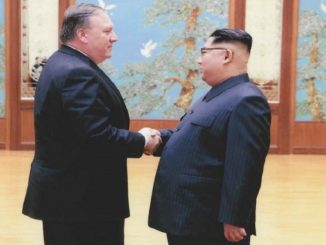
President Donald Trump has committed to signing a Russia sanctions bill, but it’s unclear if he’ll highlight his signature with a big ceremony. Major bills often have White House signing ceremonies, but Russian sanctions isn’t just any bill, The Hill reports.
It’s a measure that actually restricts Trump’s ability to lift sanctions on Moscow. And it raises the specter of the controversy that has dogged Trump’s administration since it began, Russia’s meddling in last year’s election.
A signing ceremony could give Trump the opportunity to take on critics who question his willingness to battle Russia. Yet it could also raise attention to his reservations about the bill.
Critics of Russia say a full signing ceremony featuring the president and lawmakers from both parties would send an important signal to Moscow just days after the Russian government took steps to retaliate by ordering the U.S. to drastically cut its staff in Russia.
“I hope the White House does hold a signing ceremony. It further reinforces the message that Russia’s actions are absolutely unacceptable, and this sanctions legislation sends exactly the right signal to Putin,” said Nile Gardiner, director of the Heritage Foundation’s Margaret Thatcher Center for Freedom.
The president has 10 days, excluding Sundays, from when he officially receives the bill to sign it. The bill was officially transmitted to the president Friday.
A White House spokeswoman did not return a request for comment Monday on whether Trump will host a signing ceremony for the bill. Spokespeople for the chairmen of the Senate Foreign Relations and the House Foreign Affairs committees likewise did not return requests for comment.
Staffers for several Democrats who worked on the bill said they have not heard anything one way or the other. The White House initially waffled over whether it would sign the sanctions bill, which passed by veto-proof margins in the Senate (98-2) and House (419-3).
The bill amounts of a rebuke of a president who came into office promising to improve relations with Russia.
It slaps new sanctions on Russia and codifies existing sanctions for its aggression in Ukraine and interference in the 2016 election. It also limits the administration’s ability to lift sanctions by allowing Congress to block any sanctions relief, and it allows Congress to block the return of two diplomatic compounds seized in retaliation for the election interference.
The bill also imposes new sanctions on Iran and North Korea.
Because Russia’s underlying issue is the sanctions, as well as past sanctions, a signing ceremony might not send much of a signal to Russia, though it could benefit a domestic audience skeptical of the Trump administration’s Russia policies, said Yuval Weber, a fellow at the Wilson Center.
“The signal would be more towards U.S. domestic politics rather than Russia themselves,” Weber said.
Gardiner, at Heritage, added that a signing ceremony would “send a message that the president is listening to Congress”.
“It would be good for the president to be seen to signing this publicly. It’s important for the president to be seen to fully backing this Russia legislation,” he said.




Be the first to comment